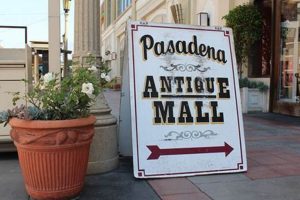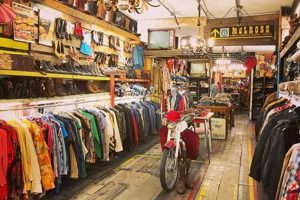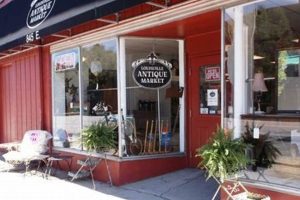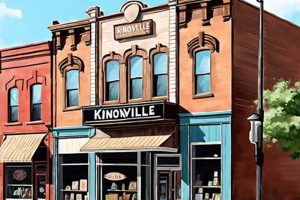Establishments in the Phoenix, Arizona metropolitan area specializing in the sale of pre-owned clothing, accessories, and household goods, typically dating from prior decades, are the subject of this overview. These retail locations offer consumers an opportunity to acquire unique and often rare items not readily available through conventional retail channels. For instance, one may find apparel from the 1960s or mid-century modern furniture within these establishments.
The significance of these businesses lies in their contribution to sustainable consumption practices by promoting the reuse of existing products. Furthermore, they preserve historical trends in fashion and design, offering tangible connections to past eras. The availability of these goods allows consumers to express individual style distinct from current mass-produced trends. Historically, such outlets provided affordable clothing options; however, their role has evolved to encompass curatorial selection and, in some cases, higher-priced, collectible items.
The subsequent sections will explore the diverse inventory offered within these Arizona retail spaces, highlighting factors that differentiate them from general thrift shops and consignment stores, including pricing models and curatorial focus.
The following guidelines provide insights for effectively exploring and acquiring merchandise from establishments within the Phoenix metropolitan area specializing in the resale of pre-owned goods from previous decades.
Tip 1: Research Store Specialties. Prior to visiting retail locations, investigate the establishment’s focus. Some businesses specialize in apparel from specific eras (e.g., 1950s, 1970s), while others curate a broader selection of household goods or furniture. Determine if the establishment aligns with personal interests to optimize time and resources.
Tip 2: Assess Garment Condition. Thoroughly examine clothing items for signs of wear and tear, including stains, tears, and damage to seams or closures. While minor imperfections may be acceptable, structural damage can significantly impact the item’s longevity and value.
Tip 3: Verify Authenticity of Designer Items. When considering the purchase of designer apparel or accessories, scrutinize labels, stitching, and hardware for indicators of authenticity. Consult online resources or professional appraisers to confirm the item’s provenance and prevent the acquisition of counterfeit goods.
Tip 4: Consider Alteration Costs. Evaluate the potential cost of alterations necessary to ensure a proper fit. Adjustments to vintage garments may require specialized tailoring skills, potentially increasing the overall expense of the item.
Tip 5: Negotiate Prices Respectfully. While not always applicable, price negotiation may be possible, particularly for items with noticeable imperfections or at establishments offering discounts. Approach negotiation with courtesy and a clear rationale for the proposed price adjustment.
Tip 6: Understand Return Policies. Prior to purchase, ascertain the establishment’s return policy. Many vintage retailers offer limited or no returns, underscoring the importance of careful evaluation before finalizing the transaction.
Tip 7: Be Aware of Storage Odors. Vintage items may retain residual odors from storage. Inquire about cleaning and restoration processes undertaken by the establishment, or be prepared to address potential odors through professional cleaning services.
Successful navigation of these Phoenix-area retail spaces requires careful consideration of item condition, authenticity, fit, and potential alteration costs. By adhering to these guidelines, individuals can enhance their probability of acquiring valuable and satisfying pieces.
The following section will delve into the curation and unique offerings of specific stores found within the region.
1. Curated Inventory
Curated inventory is a defining characteristic of establishments focused on selling pre-owned goods from previous decades in the Phoenix, Arizona, area. The deliberate selection of items, differentiated from general thrift stores, directly impacts the customer experience and the perceived value of the merchandise. The effect is a focused offering that caters to specific tastes or historical periods. For example, a store focusing on 1950s fashion will meticulously source and display items characteristic of that era, from dresses to accessories, creating an immersive environment and attracting customers seeking authentic vintage attire. This careful selection process transforms the establishment from a simple resale outlet to a destination for collectors and enthusiasts.
The importance of curated inventory within Phoenix establishments dealing in these goods cannot be overstated. It drives customer traffic, enhances brand identity, and justifies higher price points compared to stores with unsorted or broadly categorized items. For instance, a store specializing in mid-century modern furniture will likely feature pieces in excellent condition, possibly restored, reflecting a higher investment in acquisition and presentation. This specialized approach increases the store’s appeal to designers and individuals seeking authentic, high-quality vintage furniture. Therefore, curated inventory represents a significant investment and strategic differentiator for these businesses.
In conclusion, curated inventory is a cornerstone of a successful business model for establishments that sell vintage items in Phoenix, Arizona. The careful selection, authentication, and presentation of goods differentiate them from general resale outlets, attract a specific clientele, and contribute to the preservation and appreciation of historical artifacts. This understanding emphasizes the importance of specialized knowledge and discerning acquisition practices in managing a successful business of this kind.
2. Era Specialization
Era specialization, concerning establishments selling pre-owned goods from previous decades within the Phoenix, Arizona, area, represents a crucial aspect of their business model and market positioning. This focus differentiates these businesses from general thrift stores and contributes significantly to their appeal to specific customer segments.
- Focused Inventory Acquisition
Era specialization dictates the types of items a store actively seeks to acquire. If an establishment specializes in the 1970s, its buyers will concentrate on clothing, accessories, and home dcor from that period, leading to a highly curated and consistent inventory. An example would be a store known for its selection of vintage bell-bottom jeans, platform shoes, and macram wall hangings from the specified era. This focus enables efficient sourcing and appeals to consumers specifically interested in that period.
- Targeted Marketing and Branding
Era specialization informs the marketing strategies employed by these Phoenix businesses. Advertising, social media content, and in-store displays will reflect the chosen era to attract a specific demographic. A store specializing in mid-century modern furniture might use graphic design reminiscent of the 1950s and 1960s in its promotional materials. Such targeted marketing increases brand recognition among the intended audience and drives sales.
- Enhanced Customer Experience
Era specialization contributes to a more immersive and satisfying customer experience. Stepping into a store dedicated to a particular era can feel like entering a time capsule, complete with era-appropriate music, dcor, and knowledgeable staff. A business focusing on the 1920s could feature jazz music, Art Deco displays, and employees familiar with the fashion and social customs of the Roaring Twenties. This immersive environment encourages customer loyalty and word-of-mouth referrals.
- Pricing and Value Perception
Era specialization affects the pricing and perceived value of the merchandise. Rare or highly sought-after items from a specific era can command higher prices due to their historical significance and limited availability. A well-preserved vintage dress from a renowned designer of the 1960s, for example, might be priced significantly higher than a contemporary garment of similar style. This pricing reflects the item’s collectible value and its appeal to discerning buyers.
The concept of era specialization within businesses trading in pre-owned goods in the Phoenix area underscores their commitment to providing a unique shopping experience tailored to specific historical periods or aesthetic preferences. Through focused inventory, targeted marketing, enhanced customer experience, and strategic pricing, these establishments establish themselves as destinations for collectors, enthusiasts, and individuals seeking authentic vintage merchandise. Their value is in their ability to transport customers to another time through carefully selected and presented goods.
3. Local Businesses
Phoenix, Arizona’s vintage retail establishments are predominantly independent local businesses, a characteristic that significantly shapes their operational strategies, merchandise selection, and community impact. These enterprises are not typically affiliated with national chains; therefore, decisions regarding inventory curation, pricing, and marketing are made independently by the owners or managers, often reflecting personal taste and a deep understanding of the local market. The cause and effect relationship is evident: local ownership fosters unique store identities and merchandise offerings, distinguishing them from standardized retail experiences. The importance of local ownership is underscored by the businesses’ direct contribution to the regional economy and the preservation of Phoenix’s cultural identity.
The benefits are multifaceted. Local businesses contribute to the uniqueness of shopping districts, drawing both residents and tourists seeking authentic experiences. For instance, a vintage clothing store owned by a Phoenix native might prioritize Southwestern-inspired apparel or items reflecting the region’s historical ranching culture. This contrasts with larger, national retailers, which typically offer standardized inventories across locations. Furthermore, local ownership often translates to greater responsiveness to community needs and preferences, with businesses participating in local events and supporting regional causes. Such engagement strengthens the bond between the store and its clientele, creating a sense of community around the shared interest in vintage goods.
The practical significance of understanding this connection lies in recognizing the economic and cultural value these local businesses bring to Phoenix. Supporting these establishments directly contributes to the local economy, preserves unique cultural expressions, and fosters a sense of community. Consumers who patronize these stores are not only acquiring vintage items but also investing in the economic vitality and cultural heritage of the Phoenix metropolitan area. The challenges include competing with online retailers and adapting to changing consumer preferences, but the unique identity and community ties of these local businesses provide a strong foundation for continued success.
4. Sustainability Factor
The operational existence of establishments selling pre-owned goods from prior decades in the Phoenix, Arizona, region contributes to environmental sustainability. The acquisition and resale of existing items mitigate the environmental impact associated with the production of new goods, including resource extraction, manufacturing processes, and transportation emissions. The reduction in demand for new products correlates directly with a decrease in industrial activity and the associated ecological footprint. For example, the reuse of vintage clothing reduces the demand for newly manufactured textiles, which are often produced using water-intensive and chemically intensive processes. The importance of the sustainability factor within these businesses is in its role as an alternative to fast fashion and mass consumption, promoting a more circular economy.
The environmental benefits extend beyond the reduction in manufacturing. The lifespan of existing products is prolonged, diverting them from landfills where they would contribute to methane emissions and other forms of pollution. Businesses that repair and restore vintage items further enhance this sustainability aspect by extending the usable life of these products. An example includes establishments specializing in vintage furniture, which often refurbish pieces rather than discarding them. Consumers who choose to purchase vintage items are actively participating in a system that values resource conservation and waste reduction. This choice is often conscious, reflecting a growing awareness of the environmental consequences of consumer behavior. The practicality is that businesses that actively market their sustainable practices may attract consumers who prioritize environmental responsibility.
In conclusion, the sustainability factor is an inherent and increasingly important component of businesses trading in pre-owned goods in Phoenix, Arizona. While challenges exist in quantifying the precise environmental impact of these establishments, their contribution to reducing waste and promoting resource conservation is undeniable. Recognizing the value of this sustainability aspect aligns with broader efforts to foster a more environmentally responsible and circular economy within the region. The linkage between the businesses and environmentalism is evident.
5. Price Variance
Price variance within Phoenix, Arizona, establishments specializing in pre-owned, typically older merchandise is a notable characteristic influenced by several factors. These factors include the item’s age, condition, rarity, brand, and provenance. The cause and effect relationship is direct: superior condition and verifiable historical significance typically correlate with higher prices. The importance of price variance as a component of these businesses’ operational structure lies in its ability to cater to a diverse clientele, ranging from budget-conscious shoppers seeking affordable finds to collectors willing to invest in premium pieces. As an example, a well-preserved vintage dress from a known designer might command a significantly higher price than a similar garment from an unknown brand, despite comparable condition.
Further analysis reveals that price variance is strategically employed to manage inventory turnover and attract various customer segments. Establishments offering a wider range of prices increase their accessibility and market penetration. The practical application is evident in the marketing strategies employed; advertisements may highlight “affordable vintage” to attract budget-conscious shoppers while simultaneously showcasing “rare collectibles” to appeal to higher-end clients. Additionally, consignment agreements often contribute to price variance, as consignors may dictate the initial pricing of their items based on perceived value or sentimental attachment. This dynamic introduces another layer of complexity in determining prices and negotiating with customers.
In conclusion, price variance is an integral aspect of the Phoenix, Arizona, vintage retail landscape, influencing both consumer behavior and business strategy. The challenges in navigating this price spectrum include determining the true value of items and managing customer expectations. However, the presence of a varied pricing structure enhances accessibility, promotes sales, and contributes to the overall vibrancy of the vintage retail market. Understanding price variance allows consumers to make informed purchasing decisions, and enables businesses to optimize their pricing strategies to maximize profitability while catering to a broad range of tastes and budgets.
Frequently Asked Questions Regarding Vintage Retail Establishments in Phoenix, Arizona
The following section addresses common inquiries concerning businesses within the Phoenix metropolitan area specializing in the sale of pre-owned goods from previous decades. The purpose is to provide clear and concise information for both consumers and those seeking a deeper understanding of the vintage retail market.
Question 1: What distinguishes a ‘vintage’ store from a ‘thrift’ store within the Phoenix area?
Vintage stores in Phoenix typically curate their inventory, focusing on specific eras, styles, or designer labels. Thrift stores, on the other hand, generally accept a wider range of donations with less emphasis on historical significance or stylistic cohesion. The focus of vintage establishments is on quality and rarity; whereas thrift stores prioritize affordability and accessibility.
Question 2: Are prices negotiable within these Phoenix vintage retail establishments?
Price negotiation is not a universal practice; however, it may be possible in certain circumstances. Factors influencing negotiability include the item’s condition, the store’s pricing policy, and the length of time the item has been in inventory. Inquiry regarding potential discounts is advisable, although not guaranteed.
Question 3: What recourse does a consumer have if a purchased item is found to have undisclosed damage?
Recourse is contingent upon the establishment’s return policy, which should be clearly stated at the point of sale. Many vintage stores operate under a “final sale” policy. Therefore, thorough inspection prior to purchase is paramount. In instances of misrepresented condition, legal options may exist, but consulting with a legal professional is recommended.
Question 4: How can one ascertain the authenticity of designer items sold within these Phoenix retail locations?
Authenticity verification requires careful scrutiny of labels, construction, hardware, and other identifying characteristics. Consulting with authentication services or appraisers specialized in vintage designer goods is advisable for high-value purchases. A reputable seller should be transparent about the item’s provenance.
Question 5: Are vintage clothing items professionally cleaned before being offered for sale?
Cleaning practices vary among establishments. Some businesses thoroughly clean and restore items, while others leave the cleaning to the purchaser. Inquiry regarding cleaning processes is recommended, especially for items with delicate fabrics or potential odors.
Question 6: How does one locate reputable and reliable vintage stores within the Phoenix metropolitan area?
Reputation and reliability can be assessed through online reviews, word-of-mouth referrals, and the store’s history. Establishments that provide detailed item descriptions, transparent pricing, and responsive customer service are generally more trustworthy.
In summary, transacting with vintage retail establishments in Phoenix requires diligence, informed decision-making, and a clear understanding of individual store policies. Prior inspection, authentication, and communication are crucial for a satisfactory consumer experience.
The following section will explore the business model and operations of vintage stores in the Phoenix Metropolitan Area in more detail.
Conclusion
This examination of businesses located in the Phoenix, Arizona area which sell pre-owned goods from prior decades, has underscored significant aspects of their operation. Curated inventory, era specialization, local business dynamics, sustainability benefits, and pricing variances define these establishments. The analysis confirms that these factors differentiate them from general thrift retailers, offering specialized inventory and contributing to unique customer experiences.
The preceding analysis serves to inform consumers and stakeholders alike. Continued support of these establishments contributes to the preservation of material culture, the enhancement of local economies, and the promotion of sustainable consumption practices. Further research is encouraged to explore the evolving role of these businesses within the context of contemporary retail trends and environmental concerns.







